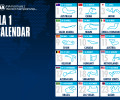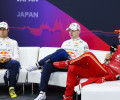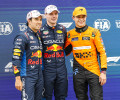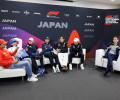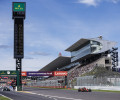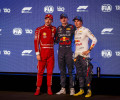F1 - 2024 Japanese Grand Prix - Friday press conference transcript
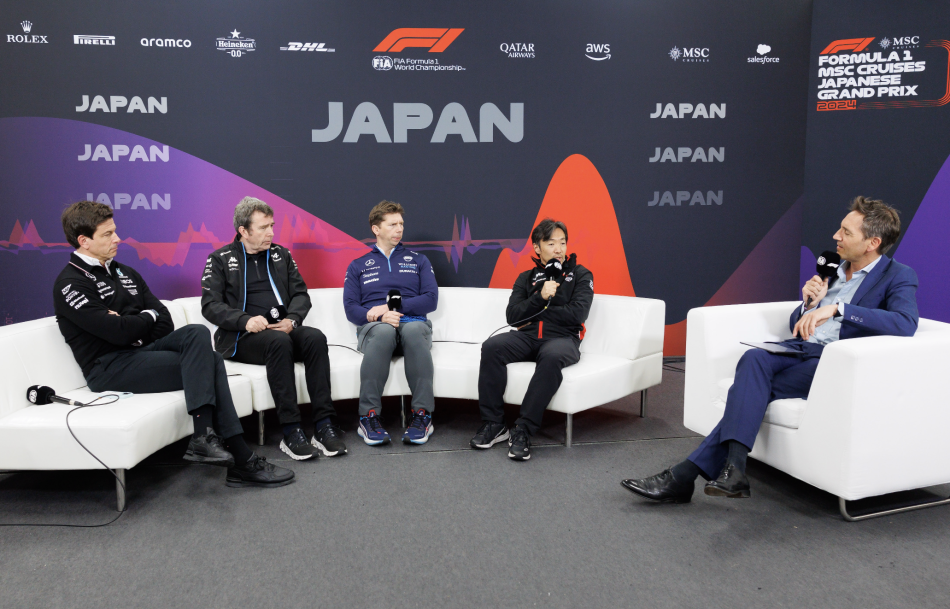
TEAM REPRESENTATIVES: Toto WOLFF (Merrcedes), Bruno FAMIN (Alpine), James VOWLES (Williams), Ayao KOMATSU (Haas)
Q: Ayao, let's kick things off with you. Your first home race as Team Principal of Haas. Just what kind of a welcome have you had from the Japanese fans?
Ayao KOMATSU: A really nice, warm welcome. Yeah, everybody's been so positive and happy, so yeah, grateful about that.
Q: Well, positive about the progress you guys have been making this year, no doubt. It is actually nigh on 100 days that you've been in the job of Team Principal. I did want to ask, how would you assess your progress so far?
AK: How do I assess it? Yeah, it's progressing. Whether it's fast enough or not is a bit difficult to say, but you can only change things at a certain pace as well, don't you? So I'm really just focused on what's in front of me, trying to make an incremental improvement as quickly as possible, but at the same time in as organic a pace as possible as well. So yeah, I think we are progressing OK, at the pace that we can sustain, if you like.
Q: How different is the vibe inside Haas this year compared to last year?
AK: Obviously, last year was pretty difficult because we just didn't have a race car. So, no matter what we did, we knew that we couldn't race on Sunday. Whereas this year, I think the communication is better. We're working better as a team. and then with a clear focus, objectives, a strategy for the pre-season testing. Again, that brought the team together as well. And then the fact that we have a race car, you know, race set-up, a driver, everybody's in a closed loop together trying to make improvements. Even Australia, you know, after that qualifying, you know, if it was last year, we knew there's nothing we could do on Sunday, whereas everybody was still pumped up, you know, because we knew we could race on Sunday, put ourselves in a position to score points. So it's positive.
Q: And Ayao, what about developments for the car? What have you got planned?
AK: Yeah, I mean, we're not going to do a big, big update. If you like, it's more, again, incremental, smaller updates. So we're going to have a fast one very soon.
Q: Well, we look forward to seeing that. Thank you very much. James, if we could come to you now. Look, first up, very frustrating session for Logan, that one. How much damage to his car?
James VOWLES: It is pretty significant. So the chassis is OK, fortunately, but I would say pretty much everything else isn't. So suspension all round, gearbox cracked, big damage.
Q: So FP2 is looking unlikely for him?
JV: It's going to be difficult. We'll obviously do our utmost to try and get the car back out there again, but the damage is extensive, so it will take a while.
Q: Have you spoken to him? What did he say was the cause of the accident?
JV: At the top of the brow of the hill there, he struggled to see where his positioning was on track. So it fundamentally looks like he didn't quite realise where he was with where the grass was on the outside and put a wheel on the grass.
Q: It does beg the question, James, did Logan feel that he had something to prove in FP1 after what happened in Melbourne?
JV: I've been chatting to him all week, all these last few weeks, in fact, because this is the point where you've got to keep a driver very close to you. You've sort of given them a very difficult situation to deal with, through no fault of their own. But he was honestly in a very good state of mind this week and last night again when I called him at about 9, 10pm, really, really strong state of mind, just wanted to get back into the car and get going, but not with the intention of proving to the world he deserves a seat, just his normal approach to things. And what you saw here wasn't a driver making a mistake because I think they were pushing to the limit. It's a very different type of mistake, a frustrating one by all accounts, because it wasn't on the limit of what the car could do. There was far more turning potential in there. He just didn't know where the car was on track relative to where he expected it to be anyway. So I don't think you're seeing there the reaction of someone that wasn't driving in Melbourne. I think you're seeing more just a situation that could have appeared at any time.
Q: As you say, relief that the chassis is OK. Can we talk about the chassis? When have you got a third chassis at a race? Can you pinpoint when that is? And also give us a little bit more information about how long it takes to build one?
JV: I think the third chassis at the moment won't be with us until Miami, a long way away. In terms of the chassis, if you put all of your resource, everything you possibly had within the organisation on it, you could be eight, 10 weeks that you pretty much get a chassis done, from freezer to something actually built and out there. And that's by the time you get to sort of the third chassis. It takes longer for the first ones as you get used to the process. Clearly we don't have the whole organisation just working on that. We're working at the same time on spares and updates and trying to get the throughput. Everything's just a huge amount that goes through the organisation at this stage. In our particular case, clearly, we don't and never had the intention of being here without three chassis. The intention was to have three right at the beginning of the year. It's an outcome from just an overload within the system, the complexity of this car and the amount that we were trying to push through. But in terms of the complexity of it, it's enormous. I mean, the chassis is thousands and thousands of pieces you're trying to bring together at the same time.
Q: Can I just open this to the other three? How many teams have a spare chassis at the races? Could I just ask all of you? Ayao, do Haas have a spare chassis here in Suzuka?
AK: Yes.
Q: You do? Bruno?
Bruno FAMIN: From the next race.
Q: So you don't have one here in Suzuka?
BF: No.
Q: OK, thank you. Toto?
Toto WOLFF: Well, we have a different infrastructure and resource than Williams, so we have. But I remember times, even at Mercedes, where it was difficult to get that third one out at the beginning of the season, so we were running that risk at well. And certainly in my time at Williams, I don't think we had any spare chassis for most of the season.
Q: OK, Toto, thank you. And James, thank you for that. I'm sure there'll be more questions for you later. Bruno, if we could come to you now. First upgrades of the season here in Suzuka for Alpine. What are the drivers saying about them?
BF: For the time being, in FP1, they were struggling more with the tyre warming than evaluating the upgrade. I think, of course, the upgrade, we know it's not a major upgrade we have. It's an improved part, mainly the front wing here and developing the aero performance and reducing the weight as well. For the time being they are quite happy but struggling with the tyre warming.
Q: And how aggressive is the development plan for this car going forward?
BF: We are pushing, we are pushing as much as we can in both factories. In Viry, for the energy management, which is the only way where we can find performance by regulation. And in Enstone, of course, mainly on the aero and the tyre understanding developments. We are pushing hard for developing that car.
Q: Can you tell us when we'll see some more upgrades on the car?
BF: We are going to have more coming for sure. in the very coming races. Race six, in Miami.
Q: Thank you. And look, just final one from me. I wanted to ask about your role as team principal, because when you were the interim last year, second half of last year, you scored lots of points. There were lots of points finishes. This year, obviously, it's a very different scenario for you. And how different are your responsibilities now, do you feel?
BF: You mean I should have remained interim? We would have scored more points.
Q: Is it harder? Do you see your role now as motivational as much as anything?
BF: The role is to restructure the team, in fact. I was in Viry for the two last years. Now I am in Enstone mainly and we need to really change the way we are working in order to develop better our car. To be more agile, to be more efficient. Then there's a lot to do. We have started to make some changes in our technical organisation, as you have seen in the last weeks. And my role is putting everything together, changing what we need to change. Of course, to change the mindset of the guys, to have the motivation of all the staff. but also having a better process and a better organisation.
Q: Bruno, thank you. I'm sure there'll be more questions for you in a minute. Toto, coming to you now. You've had double DNFs before, but they've always been aberrations in otherwise dominant seasons. And in that context, how much did Melbourne hurt?
TW: My calibration is different. I think we are honest. We know where we are on track and what performance step we need to make. And if the car is quick, I'm happy. If the car is not quick, none of us is happy. And whether we DNF or not is a matter of Constructor points. But we're looking for pace. George had an accident and Lewis DNF'd on the engine, which both of them can happen when you go racing cars.
Q: Can I ask you about George's accident? You're a former racer. What did you make of what Fernando Alonso did?
TW: You can hear the drivers. They obviously understand much more on a track that I've never raced on. They're split. I think Fernando was aggressively defending with trying to take out the momentum before the corner. Maybe he's overdone it. And George was just trying to, you know, make an overtake there, but also takes a certain part of responsibility for having lost the car there. So what I make of this accident, I think in these high-speed corners, maybe... You need to take a little bit of the karting philosophy out of killing speed before the corner in order to have a better accident. But who am I to say, I'm not sitting in that car, I've never been on that level, so I'm just an observer and I look at the data and throttle and brake input, and that was very different on that lap to all the others.
Q: Just one more from me. James Allison has spoken since Melbourne about correlation issues and a need to revamp your simulation tools back in Brackley. Do you feel you're far behind your rivals in those respects?
TW: Well, on the stopwatch we are. So there is a crook somewhere in the system because we're measuring downforce much more than we see on the lap time. And that's something that we have been struggling since those regulations came in in 2022. So we are at the point now where we are trying new avenues in order to assess how we can really... translate the performance that we see in the virtual world into the road, which we haven't been able so far to do.
QUESTIONS FROM THE FLOOR
Q: (Adam Cooper – Motorsport.com) A question for Toto about Kimi's test program. I think at one stage the provisional plan was to wait until he was 18 in August before giving him a run. Obviously now he's going to be in Austria in a couple of weeks. Does that change sort of reflect the fact that you can't wait to assess him and get him up to speed? And can you tell us a bit more about what the plans are for him?
TW: The programme of Kimi driving Formula 1 has been in place for a long time and hasn't changed massively over the last few weeks. What we have done is added more days, but what you will see in the next few months has been in place, whether or not he's going to sit in a Formula 1 car next year. So, yeah. We're going to do a few of these days for him to get comfortable in an F1 car. He's driving the 2021 car in Austria for the first time. We want to give him a feeling what a really good car feels like before we put him in the ’22. Obviously, he's been our young boy since a long time, with James, and we're keen to see what he's able to do in a Formula 1 car. Ollie Bearman was refreshing to look at how competitive he was in Saudi Arabia. No free practice, high speed, complicated track, and he was right up there. So Kimi would be doing just fine.
Q: (Luke Smith – The Athletic) Toto, another driver question for you. At the other end of the age spectrum, Sebastian Vettel. He's been speaking in recent days, saying that he's been talking to you about various things. Lewis said yesterday he thought that Seb would be an amazing option for Mercedes next year. Is Sebastian Vettel a serious consideration on your shortlist for next season?
TW: Sebastian is someone that you can never discount. I think his track record is phenomenal. And sometimes maybe taking a break is also good to re-evaluate what's important for you and refine your motivation. As I said before, I think we haven't taken the decision yet. And it's not something that we plan to do in the next few weeks. I know that the driver market is very dynamic. Some of the really good guys are about to sign for some of the other teams. We want to continue to have these discussions and keep the options open. But at that stage, I think it's much too early for us to commit to a driver, whether very young or whether very experienced – I don't want to say old – very experienced, which the next few months will give us more clues.
Q: Toto, you say it's too early, but have you whittled it down in your mind to one, two, three drivers? Have you got that far?
TW: Yes.
Q: Can you give us a number?
TW: No.
Q: (Jon Noble – Autosport.com) John for Toto. You originally weren't coming to this race. What was the decision-making process to decide that you were coming? And in terms of leadership challenge, how is this season compared to some of the struggles you've had over the past two seasons?
TW: Yeah, I had planned not to come to Japan because there's so much on back in Europe, things to do. But then I felt not coming to Japan was the wrong choice. I think it's important to be with the race team also. It does me good also to be close to the action. We are experimenting with a few things and then being part of the team really gives me energy. I hope the other way around too. So that's why I decided against staying in Europe. And the struggle that you've mentioned. I think we're a sports team. We've won eight times in a row and that hasn't been done before. you have periods where you struggle like any other sports team and you can't win every time. That's why this is a super challenge. It's not a race, it's not one single season and then you come back out on top, but it's the third one in a row. But I remain absolutely convinced that we will be looking back in a few years and saying that was so tough but so important for the development of the team from maybe an organisational standpoint, from re-evaluating our tools and systems, which clearly don't work as good as they did in previous regulations.
Q: (Joel Tansey – The Japan Times) This is for Ayao. You had said that P8 was kind of the target for Haas this year. And I'm just wondering if it's too early to kind of readjust that, given the success you've had so far?
AK: Yeah, I think P8 is still a challenging target. You know, if you look at our competitiveness, yes, OK, we are P7 in the championship currently, but Bahrain, we are competitive, P6, P7, but Melbourne, okay, we scored points with both cars. But if you look at our race pace, we are P8 or P9. So and then, of course, now the development race is coming along and then we all know we are the smallest team. So for me, still to achieve the P8 this year would be a huge challenge and we have to keep ourselves grounded and be realistic.
Q: Ayao, can we just stay with you? Toto mentioned Ollie Bearman in Saudi Arabia. Are we going to see him racing or not racing, but perhaps doing an FP1?
AO: Yeah. So he's going to be in our car in FP1 for Imola. That will be the first time. And then we will run him six times this year. So really looking forward to that.
Q: (Joost Medema – NOS) A question for Toto. Could you, as the most senior team principal in this group, tell me something more about the situation James has found himself in in Australia with the decision he took to take Logan out of this car? What does it take for him as a team principal? And how would you work together with the driver in that situation for the rest of the season?
TW: Well, Bruno's a bit older than me, you know. So in terms of seniority, you're more experienced.
BF: Quite a lot, yeah.
TW: Yeah, quite a lot. So what was your question? What?
Q: Just the decision that James had to make in Melbourne. Just what are your thoughts?
TW: That specific decision? Brutal, brutal, difficult situation for James and his senior team, because as a racer, you're thinking like that doesn't feel right, taking a car from one drive and giving it to the other. But James represents a large organisation with shareholders and investors, sponsors, a global market, and needs to maximise the points because every change of position is potentially tens of millions in difference and has long-term effects. Giving the car to the driver that has more probability in scoring the points is absolutely the right thing to do, as tough as it is for Logan. And I'm sure it would have been very tough for James to take that decision, but it was absolutely necessary.
Q: (Joost Medema – NOS, question): And what would it mean for the cooperation between team principal and driver for the rest of the season?
TW: I think what I've said always in the past, what I've learned from… When I asked Alain Prost the question in my early years of Mercedes, why did the relationship deteriorate between the drivers and with the management? He said, because it was never transparent. We never knew what actually was going on and why decisions were taken. And this is something that I tried to implement in the team. In Mercedes, very early on, and obviously James was part of my journey, I was part of his journey that sometimes… You know, transparency is everything. We are very open and some but sometimes the truth is brutal and difficult to take. But you know, if you're Team Principal or a senior person in the organisation you’ve got to have to take that call and make the driver or whoever it is that is facing that situation, try to make them understand why you've been doing that. And sometimes that is a relationship that can thrive from there onwards because you trust each other in the terms of speaking the truth. Sometimes it's affected in a negative way because it's just difficult to take, but whatever it is, I think being open, honest, [with] integrity and transparent is most important.
Q: (John Getty – Reuters) Toto, can you confirm reports that the damage suffered to Lewis's power unit in Melbourne is terminal? And what does that mean for the rest of the season? Is it concerning to lose one of the quota so early in the season and risk potential penalties later on?
TW: Yeah, that one is for the bin. It is a very highly unusual failure that we have, a hardware failure that we didn't see coming before. So yeah, we can't reuse that. And it depends how the season develops, whether we need one more or not. I can't really see at that stage whether that will be needed or not.
Q: (Adam Cooper – Motorsport.com) A question for all of you. We had an unusual situation recently where McLaren hired a top technical name. They waited a year for his gardening leave to run out, but when he turned up, it turned out the job wasn't really the one he was expecting, apparently. In these days where some teams have CTOs, occasionally multiple technical directors, performance directors, and so on, how hard is it to make sure you put people in the right places, you don't have square pegs and round holes and so on, and that you give people, the top people, the responsibility that they're expecting?
JV: I think the first thing is a year is a long time in our sport, but that's how long we're typically waiting now for top tier talent to come in. We're in the same position. We have many hires that we've made, but it'll be a while before they come in. So you have to keep moving. You have to keep developing the organisation around that. And I don't know the specific case with McLaren, but it may well be that they've had to bring the organisation up to speed, because fundamentally we're in a very close fought race between all of us and that migrated the role from something different. The key behind it is creating enough structure that you can, when you have good hires coming in, that they can slot into an organization without that role disappearing, which is, I hope, what we're creating for the future. It's why I keep talking about 24 and 25 aren't the most important years. What's important is creating long-term stability and foundations onwards from that. And a key part of that is creating roles and structure that you know are going to be correct in two years, not today.
AK: Yeah, it is quite challenging. So for instance, when I took over in the 10th of January, I had to look at, OK, with the restructuring, how many senior positions we can fill internally. And if the answer was, let's say, only 50%, I had to review that restructure. But when I looked at it, I realised that we can fill 90% of that with internal promotions or repositioning people. So you really got to understand each one's capability, even the character, how each people work together in terms of an organisation. So it's very challenging, but luckily, I always believed we had good people. OK, we don't have many people, but we had good people. So at least to restart the organisation, I could do it 90% internally. But yes, at some stage, we need to start hiring external senior engineers. At that point, it'd be challenging. it's not easy but I think each organisation is very different. You’ve got to really look at your own case and then find your own solution.
BF: Yeah, I think an organisation is something very dynamic. It's not frozen anymore. I think we need to adapt the organisation to what we want to do with the processes, for sure. The tools, the technology evolve on a permanent basis, let's say. And depending on the people we can hire or not, depending on the weakness you want to work on, you can make an evolution of the organisation. And yeah, it's a bit like the cars now. It's very dynamic and it's non-stop. It's an endless process, in fact, hiring people, adapting the organisation, and I think we are all on it.
TW: Yeah, there's not really much to add to what has been said. An organisation is a dynamic structure that can change a lot from one year to the other and then obviously there's a human component also and all that plays a factor and I think you’ve got to be agile. You’ve got to be able to change decisions or revert to other decisions if you feel that they are not the right ones anymore. And without knowing the specifics of that case, I'm not surprised. In the conventional business out there, that happens all the time.
Q: (Mat Coch – Speedcafe.com) Bruno, when Oliver Bearman’s name got mentioned before, you were nodding along with the job that he'd done at Ferrari. Liam Lawson last year did a pretty good job for RB, such that he's now put Daniel under pressure. You've got Jack Doohan, who beat both those guys in the junior formula. What's his future with Alpine? Is he going to get a chance? Is he in consideration for a race drive next year? Where does he fit in?
BF: First, we are very happy and proud to have Jack in the academy. I think he has been trained and he will be trained this year with quite a long testing programme. We are going to start soon because we need a car, we need a chassis to run that programme as well. And after, let's say, the drivers’ market is going to be also very dynamic. And right now, I can say that we are happy with the drivers we have, of course. But we are prepared for any scenario. And I think Jack needs to test to keep growing, to keep improving. And let's see what will be his future for us. But it's a bit early to answer to that question.
Q: (Velimir Veljko Jukic - AVTO FOKUS Magazine) I have a question for Mr Komatsu. You made an ultimate step from engineer to manager, and now you can combine both two together. How do you see this as your maybe best life opportunity or challenge? And second, do you have some special plan for your home race?
AK: Well, the transition from engineering to management, of course, I was a senior engineer before, so I was doing some management before as well. And of course, now I'm looking at a bigger picture, but it's something I really enjoy. But of course, I'm not doing it alone at all. We've got really good, capable people around me and giving me lots of support. So I'm really grateful about that. And honestly, the best thing I enjoy is teamwork. Really, when I see giving people responsibility, opportunities, when they rise to it and then they flourish, I take lots of positive from that. So it's very good. And what was your second question? Home race, got any special plans? I wish I had one. As you saw from our Sector 1 performance, we knew we were going to struggle in Sector 1 here, because that's the weakness of our VF24 at this minute. So, yeah, it's in case of managing that and then qualify as best as possible. And then, like in Australia, we want to race at our best capability and then just put ourselves in the position that if something happens in front, we can score points.
ENDS.

 Facebook
Facebook Twitter
Twitter